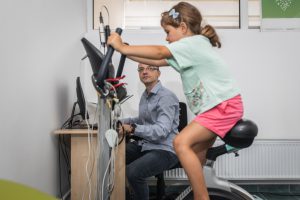As parents, we know there are lots of reasons why we shouldn’t be overloading our kids with sugar. A treat now and then is no big deal, but a steady diet of sweets can lead to health issues now and later in life. But is hyperactivity one of the reasons that you consider sugar a problem for your kids? How many times have you thought, “Oh great, his grandma got him all hopped up on sugar and now I’m going to have to deal with it!” or “She’s never going to sleep again after all that cake and candy she ate at that party!” If you’re one of the many parents who have fretted over their kids having too much energy after a sugar-filled holiday or party, you’re not alone. But are you right to worry, or is it all in your head? And why do kids have so much energy anyway?
Why Do We Associate Sugar with Hyperactivity?
While it may seem like we’ve always intuitively associated eating too much sugar with overactivity in children, we didn’t always believe this. In fact, the whole idea that food affects behavior can be traced back to one doctor and his diet. In 1973, allergist Benjamin Feingold, M.D. created his “Feingold Diet,” which advocated for eliminating all additives such as artificial colors and flavors from one’s diet. Feingold believed that removing these additives could help to treat allergies and help reduce hyperactivity.
Although Dr. Feingold didn’t specifically target sugar as the most important thing to eliminate from a family’s diet, the idea that any type of food additive could be linked to behavior spread quickly. Refined sugar came under scrutiny as just another unhealthy thing added to children’s food, and parents began to associate it with exacerbating behavioral issues or overactivity in their children.
The Research

The idea that sugar affects behavior has become ingrained in our collective consciousness, but the truth is that there is no science to support it. All of the claims from parents that cookies and candy led to wild behavior in their kids began encouraging debate in the scientific community, who began studying whether sugar actually has an affect on children’s behavior. The result: various studies over several decades have found no evidence that sugar or artificial sweeteners cause hyperactivity, or even any kind of behavioral changes, in children.
Scientists actually came to this conclusion in the mid-1990s. In a 1994 study, children (some of whom were described by their parents as “sensitive to sugar”) and their families were placed on a different diet for three consecutive three-week periods. For each period, the families consumed a diet either high in sucrose with no artificial sweeteners, a diet low in sucrose and containing aspartame (artificial sweetener), or a diet low in sucrose and containing saccharin (the placebo). Parents were asked to keep track of their children’s behavior throughout each three-week period.
The conclusion of all the tests performed by the scientists, as well as the reports from parents, was that sugar and artificial sweeteners had “no discernible behavioral or cognitive effects” on the children. In addition, in 1995, the Journal of the American Medical Association reviewed all the various studies done on this subject and also concluded that sugar does not lead to hyperactivity in children.
Parental Expectations
If scientists debunked the idea that sugar causes hyperactivity in children in the mid-1990s, then why do so many of us still believe it? Well, the one common thing that did change in all of these studies was the parents’ expectations of their children’s behavior. For example, in one study, parents who were told their 5-7-year-old sons were given large amounts of sugar (when they had actually been given a placebo) were significantly more likely to describe their children as very hyperactive than the parents who were told their children had received a placebo.
Parents who believe that sugar makes kids crazy are more likely to see a link between sugar and hyperactivity. In addition, you just need to think about where and when children tend to eat a lot of sugar to understand why they might seem overstimulated to parents afterwards. Birthday parties, holidays, visits to their grandparent’s house – all of these special occasions can be exciting and have relaxed rules, meaning that it might be the situation and not the food that is causing your child to act differently.
The Scientific Reason Children Have So Much Energy
Whatever the research says about children and sugar, there’s no denying that kids have a lot of energy. Besides the reasons mentioned above, there are also scientific reasons behind it that aren’t related to diet. For one thing, a study published in Frontiers in Physiology found that young children have muscles that can perform at a similar level to those of endurance athletes. Children were pitted against endurance athletes on stationary bikes and were found to tire less easily.

Not only that, but in these tests, their bodies bounced back faster after exercise. According to researchers, kids just don’t seem to have the same anaerobic system as adults. Anaerobic energy is burned during short, strength-building activities like jumping, sprinting, or weight training. It causes your body to produce lactate, which builds up in your muscles and makes you feel tired. Children don’t produce as much lactic acid, meaning that they won’t feel as tired after lots of activity the way you will after a session at the gym. All of this could explain why running them around at the park doesn’t always work to tire them out!
But it’s not only their physiology that makes them so energetic. Think about your child’s relationship to the world around them, and to their own bodies. Everything is new to them, and they are learning who they are and how they fit into the world. It’s natural that this will make them seem like they’re bursting with energy! As pediatrician Dr. Ken Haller points out, “At 4, a child has gained control over her body. This gives her a feeling of independence, and it naturally leads to more active behavior.”
Whatever the reason for your child’s high energy levels, it can feel exhausting to keep up with them! We totally get that. The take-aways, though? Don’t worry that the occasional sugar-fest is going to drive them nuts; instead, focus on feeding them healthy foods when you can so you can properly fuel their play, and sit back and enjoy the show as they come into their own!


